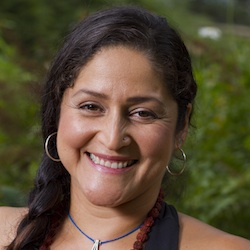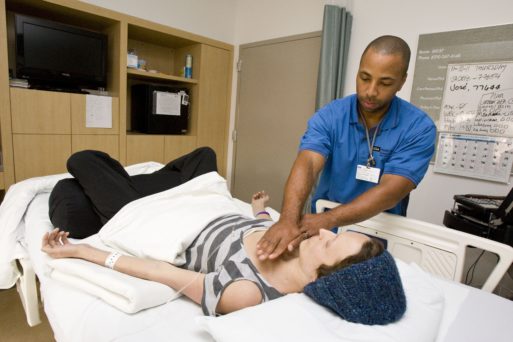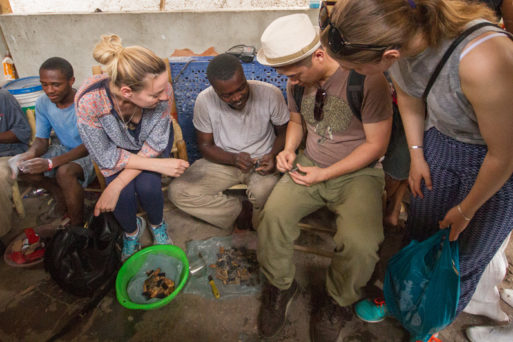Today SevenPonds speaks with Menna Olvera Feder, program director for the Urban Zen Integrative Therapy Program (UZIT). A yoga teacher and Urban Zen integrative therapist, Menna studied under Rodney Yee and Colleen Saidman Yee, who, along with designer and philanthropist Donna Karan, started the Urban Zen Foundation in 2009 following the death of Donna’s husband Stephan from cancer. The goal of the program is to provide an approach to healthcare that treats “the patient, not the disease” by integrating traditionally Eastern healing modalities with Western medicine.
Editor’s note: This interview has been edited for length and readability.

Credit: uwsyoga.com
Kathleen Clohessy: It sounds like Urban Zen Integrative Therapists are very skilled in many different disciplines. How does one become a therapist and what is the training like?
Menna Olvera Feder: UZIT training is multidimensional, as you might expect. It begins with a 2-and-a-half day training on self-care, which is geared towards the average person. Then, there is a 7-day Level I certification course for medical and allied healthcare professionals such as yoga therapists, Reiki practitioners, doctors and RNs. Then the advanced level program includes a total of 12 in-person training sessions that cover the five core modalities — yoga, essential oils, Reiki, nutrition and contemplative care. Therapists learn how to teach patients chair and in-bed restorative yoga poses and how to use mindful movements and breathing techniques to improve symptom control. They also receive Level I Reiki training, and learn how to integrate about a dozen essential oils, such as lavender, lemon, peppermint and some special blends, into their practice. There are also classes in nutrition and contemplative care, which includes mindfulness and other skills needed to stay calm and present in the midst of suffering and death.
In addition to the in-person trainings, the Urban Zen therapist-in-training needs to complete 18 practice sessions with friends or family, and a minimum of 50 clinical hours, some of which are with a mentor, some of which are with another trainee or on their own.
Lastly, they have to complete a three-day silent retreat.
Kathleen: That is intense! Do people have to travel to the Urban Zen Center in New York for the trainings or are they available elsewhere?
Menna: In the beginning all of the trainings happened at the Urban Zen Center, but we now have a network of training centers across the United States. Right now there are several locations in California (including UCLA); one in Naperville, Illinois, outside of Chicago; and one in Columbus, Ohio. We will also be establishing a training center in Boulder, Colorado, in 2019.
Some of our centers also offer drop-in classes for the public, which focus on different aspects of self care. If your readers are interested, they can find a list of locations on the Urban Zen website under Training Programs/Find a Class.

A therapist uses Urban Zen Integrative Therapy in the clinical setting
Kathleen: I’d like to switch gears just a bit now and talk a bit about the Urban Zen Foundation. What is it and how did it come about?
Menna: Sure. As you probably know, the Urban Zen Foundation is a nonprofit that was founded by fashion designer Donna Karan following the death of her husband, Stephan Weiss. Stephan lived with lung cancer for seven years, and both he and Donna were determined that his legacy would be something that would change our approach to healthcare in a very meaningful way. What came out of that were three related initiatives, UZIT, Preservation of Culture and Education.
Kathleen: The Foundation has done a lot of work in Haiti and other impoverished countries. What does that entail and how does it integrate with UZIT?
Menna: Donna is definitely a forward-thinker, and she has been working with artisans in Africa, Haiti, Guatemala and other parts of the world for years to help them to create items that can be resold. The goal is to support the local economy, fund education and healthcare and preserve the unique culture or the region at the same time. She’s even taken students from the Parson’s School of Design with her on many of these trips to help generate ideas for how to turn local crafts into sellable products.

Parsons School of Design students with Haitian artisans
Credit: newschoolnews.edu
At the same time, the Foundation has also sent UZIT therapists to Haiti to train local healthcare practitioners in UZIT techniques. As you might imagine, the resources available in the hospitals and clinics there are extremely limited. So having UZIT in their toolbox is an invaluable resource.
The trainers also go into the local schools and teach children yoga and other techniques that integrate mind-body-spirit awareness into their lives at a young age. It’s all about changing the way we look at health and wellness, both on an individual level and in our communities.
Kathleen: What a wonderful program!
Menna: Yes it is!
Kathleen: Is there anything else you would like to share with our readers before we close?
Menna: I’d just like to emphasize that Urban Zen Integrative Therapy is not just for people who are sick or people working in healthcare. Anyone can learn UZIT self-care techniques; you don’t need to know yoga or have experience in mindfulness to do it. And, once you have the skills in your toolbox, you can practice them anywhere, anytime. It’s a wonderful way to manage the stress and anxiety that we all experience from time to time.
Kathleen: Thank you so much, Menna. It’s been a pleasure speaking with you.
Menna: You’re very welcome!
Did you miss part one of our interview with Menna Olvera Feder? If so, please catch up here.

 What Is the Urban Zen Foundation and UZIT?
What Is the Urban Zen Foundation and UZIT?


 Honoring Seniors, Caregivers: Inside the Vision of Carehaus
Honoring Seniors, Caregivers: Inside the Vision of Carehaus
 “In Case You Don’t Live Forever” by Ben Platt
“In Case You Don’t Live Forever” by Ben Platt
 Our Monthly Tip: Make an “In Case of Death” File to Ease Loved One’s Grief
Our Monthly Tip: Make an “In Case of Death” File to Ease Loved One’s Grief














